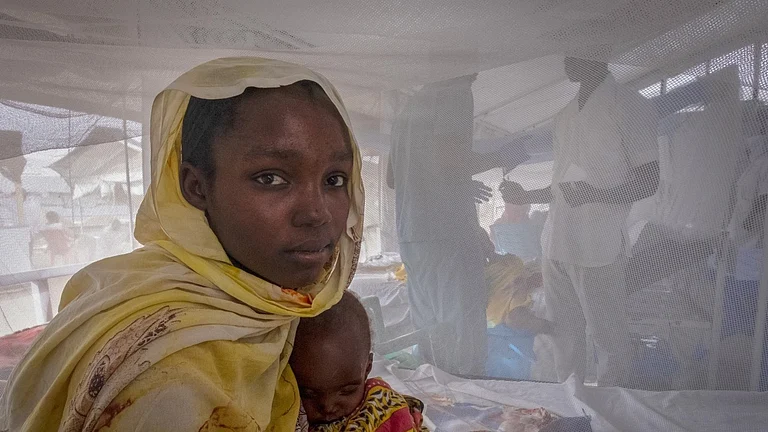Russia vetoed a United Nations Security Council resolution last week that called for an immediate ceasefire in Sudan. The country remains engulfed in a deadly conflict that has displaced millions. Despite Russia's veto, China, a close ally, supported the resolution, which was sponsored by the United Kingdom and West African country Sierra Leone. All other U.N. Security Council members also voted in favour.
What Is Russia's Role In Sudan’s Civil War As It Vetoes Ceasefire Resolution?
As Russia vetoes a U.N. ceasefire resolution in Sudan's civil war, let’s take a look at Russia’s involvement and interests in the ongoing conflict.
Following the vote, U.K. Foreign Minister David Lammy, who presided over the meeting, addressed the council, stating, “This Russian veto is a disgrace. … While Britain works with our African partners, Russia vetoes their will.” He questioned, “How many more Sudanese have to be killed, how many more women have to be raped, how many more children have to go without food before Russia will act?”
The ongoing battle between in Sudan the Sudanese Armed Forces (SAF) and the Rapid Support Forces (RSF) is one of the most underreported conflicts globally. The power struggle between the two has killed tens of thousands and displaced over 11 million people since the outbreak of the war in April 2023.
At the heart of the conflict are two generals: Abdel Fattah al-Burhan, leading the SAF, and Mohamed Hamdan Dagalo, heading the RSF. Violence continues in Sudan as the country's two top generals, who once worked together and carried out a coup together, now battle for supremacy.
The draft resolution, proposed on November 18, urged the warring factions to “immediately cease hostilities and engage, in good faith, in dialogue to agree steps to de-escalate the conflict with the aim of urgently agreeing a national ceasefire.”
Also Read | A Never-Ending War: Sudan's Humanitarian Crisis
After the vote, Russia’s deputy ambassador to the U.N., Dmitry Polyanskiy agreed “that the conflict in Sudan requires a swift resolution” and that “the only way to achieve this is for the warring parties to agree to a ceasefire”.
However, he argued that the UNSC should assist the parties without imposing the views of individual members through council decisions. Polyanskiy accused the U.K. and Sierra Leone of “double standards,” pointing to Britain’s support of Israel’s ongoing humanitarian violations in its war in Gaza, and said Lammy’s criticism was an “excellent demonstration of British neo-colonialism”.
Who Is Russia Supporting In Sudan’s Civil War?
In the devastating conflict between the Sudanese army and the RSF, the Kremlin initially supported the RSF through its semi-state-run Wagner Group.
However, on April 29, Deputy Foreign Minister Mikhail Bogdanov indicated Moscow's gradual shift toward backing the Sudanese military-led government during a visit to Port Sudan. Leading a delegation that included military officers, Bogdanov met with General Abdel Fattah al-Burhan in the Red Sea city, where the army-controlled government is currently based.
According to Eurasia Daily Monitor, Russia previously viewed RSF leader Muhammad Hamdan Dagalo, known as “Hemetti,” as instrumental in securing a Russian port on the Red Sea in Port Sudan. However, this dynamic has since changed.
Reports suggest that before his death, Wagner Group chief Yevgeny Prigozhin collaborated closely with the RSF, providing arms in exchange for gold. Despite this, the Kremlin maintained open channels of communication with the opposing Sudan Armed Forces (SAF) and the Transitional Sovereignty Council (TSC) government.
Samuel Ramani, an Associate Fellow at the Royal United Services Institute and author of Russia in Africa and Putin's War on Ukraine, highlighted Moscow's delicate balancing act between the two factions. Since the 2018–2019 revolution that ousted Omar al-Bashir’s regime, Russia has pursued a dual strategy in Sudan.
“There are almost two different Russian policies, with the official Kremlin leaning towards Burhan and Wagner leaning towards Hemetti,” Ramani explained to The New Arab.
Russia's Interests In Sudan
Russia’s geopolitical interests in Sudan encompass multiple dimensions. Sudan’s location is important as it provides access not only to the Middle East and North Africa but also to the rest of Africa. Its position along the Red Sea and near the Suez Canal makes it a key point for international maritime trade, facilitating transport of a large portion of goods between Asia, Europe, and America through the Mediterranean.
According to Military Review, Russia is keen to advance a 2019 agreement with Sudan to establish a naval base on the Red Sea near Port Sudan. This base would accommodate up to four ships, including vessels equipped with nuclear power. However, progress on this deal has stalled due to the lack of a functioning parliament or legislative body in Sudan to ratify the agreement.
Gold is another key factor. Sudan is Africa’s third-largest gold producer, and Russian companies have shown interest in mining. The Wagner Group has worked with the Dagalo family to mine and export gold from Darfur. The Dagalo family has operated a mining company in areas of Darfur since 2017.
Politically, Russia is also trying to limit Ukraine’s influence in Sudan and take advantage of the absence of U.S. presence in the region.
